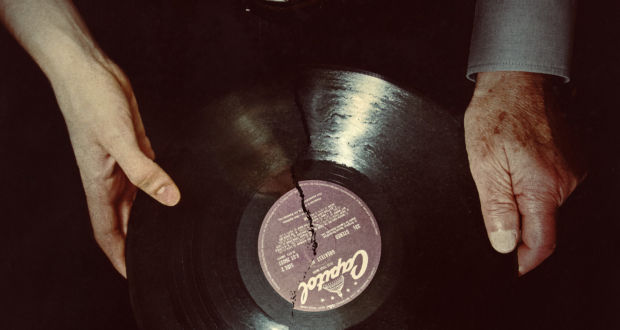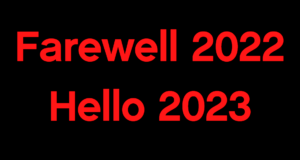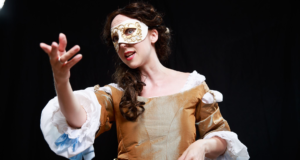Actor and playwright Matthew Seager is fresh from a residency at the Lyric Hammersmith, where – thanks to the Emerging Artists programme – he has had a chance to develop his debut play In Other Words. Now, Seager is presenting the play at The Hope Theatre, where the playwright can also be seen on stage in the role of Arthur. In Other Words is a tender and long-lasting love story, which explores how music can help create coping mechanisms for patients with Alzheimer disease. In this interview, Seager shares the creative inspiration behind his work and his special relationship with music.
Your debut play In Other Words has just opened at The Hope Theatre. Can you tell us what it’s about?
In Other Words spans fifty years of Arthur and Jane’s relationship. It is a love story which explores the transformative power of music in life – particularly in relation to Alzheimer’s disease – through the couple’s connection to a particular Frank Sinatra song. I won’t say which song . . . but it’s a great one. They all are!
Dementia is a global issue that affects over 46 million people worldwide. Is there a particular reason why you chose to focus on this topic? What have you discovered about the disease in the process of researching it for the show?
In my last year at University of Leeds, I facilitated ten weeks of sensory stimulation and music-based workshops in a dementia care home in Leeds. It was such an incredibly eye opening experience. We would sing at the end of each session and some residents – who were seemingly unable to communicate, or were almost totally unresponsive – would stand and sing along to a familiar song from their past. It was an incredible and totally inspirational to see these people come to life in that way. I’ve learnt so much from it. As well as personal experience, there is such a wealth of documentary footage available, which has allowed me to understand things a bit more scientifically, as well as from a practical and emotional point of view.
Music plays an important role in this story. How do you personally relate to music and what should audiences expect music-wise from this production?
I think music plays a huge part in my life (as it does with many people). In my opinion, there is rarely a situation that isn’t enhanced by a bit of music. We had a moment in rehearsal yesterday, actually . . . There is a scene where we dance to You make me feel so young and we just thought ‘this is all so good’! There’s lots of music in the show and it all follows the Sinatra/Swing vein.
You have just concluded a residency at the Lyric Hammersmith, thanks to the Emerging Artists Programme. Did this help to develop your piece and, if so, how?
Yes, immensely. To have a week in such a great space, with such great people, was hugely constructive. We had a sharing play to work towards but it wasn’t for the public. This meant that we didn’t feel pressured to make something perfect but just to have a play.
In addition to writing In Other Words, you’re also on stage playing Arthur, one of its two characters. How does it feel to be acting out your own words? Do you think it brings any extra benefits or challenges?
Both, for sure. It means I’ve got a good understanding prior to rehearsals, which helps with the world of the story and with understanding the character. The issue could arise if I didn’t feel comfortable in stepping away from the play as a writer and just concentrating on acting. Luckily our team is brilliant and I have such confidence in Paul Brotherston – who is directing it – that this isn’t a problem.
To what extent has Brotherton’s direction contributed to shape the performance? Has he highlighted insights about the play that you hadn’t taken into account whilst writing it?
He has designed the show as well, therefore, he really has control over creating that world for the audience. He’s turned it from a great piece of development work, to a proper show. That’s good enough for me!
What piece of advice would you give to other emerging playwrights that are striving to get their work noticed?
This is a hard one and I wonder what the best thing to do is. Getting out there and making your own work, being persistent and not waiting for it to ‘just happen’, is probably useful. I hope so, anyway!
What’s next after In Other Words? Are you working on any new projects?
I’ve got a couple of acting jobs lined up. In April and May, I’m off to tour Scotland with Blood of the Young’s piece of new writing Daphne Oram’s Wonderful World of Sound. Paul Brotherston is the Artistic Director of that company and we work together a lot. Then I’ll be off with Shakespearean company The HandleBards, from June until September. I’ve toured with them before and they are FANTASTIC.
In Other Words is playing at The Hope Theatre until 18 March 2017. Tickets can be booked here.
 Everything Theatre Reviews, interviews and news for theatre lovers, London and beyond
Everything Theatre Reviews, interviews and news for theatre lovers, London and beyond



